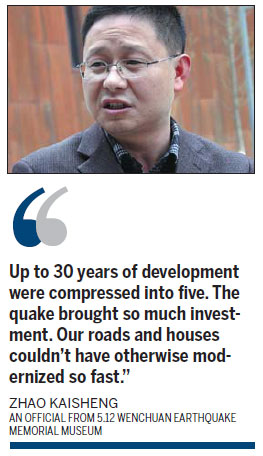Temblor's deathly shadow finally exorcised
Updated: 2013-04-06 08:10
By Erik Nilsson (China Daily)
|
|||||||||||
Technician Li Zhongyu used to return to his native Hubei province during Tomb Sweeping Day to visit his father's grave but has spent the festivals in Hanwang since the quake.
"I lost a lot of colleagues and friends," he said. "I want to commemorate them."
Much has changed for Li and his coworkers since that day when he saw part of the factory explode and went searching the ruins for his girlfriend in Hanwang town.
The 29-year-old Hubei native married her last year. She now stays in their new home in Bajiao, caring for their newborn son.
Dongfang crane operator Wen Rui will also spend Tomb Sweeping Festival in Hanwang, rather than her hometown, Sichuan's capital Chengdu.
"I'll honor those people I knew who didn't make it," the 38-year-old said.
Surviving the quake and relocating to Bajiao has transformed Wen's life.
Her salary has more than doubled to about 3,000 yuan a month, and the factory is more advanced, she said.
"The big city brings new conveniences but also demands," she said.
Her 15-year-old daughter's education has been her greatest concern.
But the girl's informal learning experiences are broader, Deng explained.
"Here, we can have a car and take our daughter around on weekends," Wen said.
"The city offers more to stimulate her development. She can go to more places, meet more people, see more things. It expands her horizons."
Despite drawbacks, her new life is better than before the disaster.
"Aside from the deaths, the quake is a great thing for people here," Wen said.
 |
A museum recently opened in Hanwang, near Dongfang's factory ruins. It is built beneath an iconic clock tower frozen at 2:28, the moment the Wenchuan earthquake struck.
It is frozen in time. But life tells a different story.Hanwang resident Jiang Mei says much has changed for her family since the day of the quake, when she sprinted to her 9-year-old daughter's kindergarten.
"Life's better than before the quake," the 36-year-old said.
"We cried then. Now, we're thankful for what we have. My heart is full of love."
She is thankful to have a new home after spending the first night in a tent in the rain.
"Not only do we have a house but we also have electronic appliances," she said.
But the changes haven't merely been material.
"The disaster showed we should teach our daughter to love and help others and be grateful for the help she receives," Jiang said.
"The disaster showed me we should all live this way. Our town learned this lesson."
She said survivors are more charitable and courteous. They are more likely to give bus seats to the elderly.
"Everything is better aside from one problem," Jiang said.
"My husband works as a migrant because there's no major company here. It would be nice if we could live and work together."
She said this while sitting beneath her wedding portrait and holding their daughter's hand.
Jiang is thankful her daughter has never remembered that day.
Chen is grateful his students have since forgotten.
The principal explained the past five years of helping the children recover have helped him, too.
"I'm more upbeat," he said.
"I rarely lose my temper. I've matured. I've found peace. The quake taught me to value life and stay positive."
Huang Zhiling and Cao Huan contributed to the story.
Contact the writer at erik_nilsson@chinadaily.com.cn.
Related Stories
New life in Sichuan 5 years after quake 2013-03-29 10:21
Chengdu has world's largest quake monitor 2013-03-19 16:39
30 schools suspend class in quake-hit SW China 2013-03-04 14:06
Fresh quake jolts SW China 2013-02-20 21:39
Today's Top News
Police continue manhunt for 2nd bombing suspect
H7N9 flu transmission studied
8% growth predicted for Q2
Nuke reactor gets foreign contract
First couple on Time's list of most influential
'Green' awareness levels drop in Beijing
Palace Museum spruces up
Trading channels 'need to broaden'
Hot Topics
Lunar probe , China growth forecasts, Emission rules get tougher, China seen through 'colored lens', International board,
Editor's Picks

|

|

|

|

|

|





